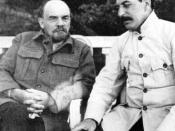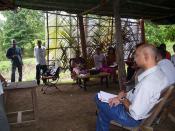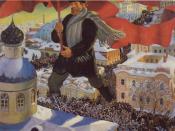Josef Vissarionovich Stalin's ascent to ruling the USSR was neither easy nor inevitable. His bid for power came at a time of political instability in the USSR after the incapacitation of Vladimir Ilyich Lenin. Lenin suffered three strokes from May 1922 to March 1923 which may have led to his death at the age of 54 on 21st January, 1924. Leon Trotsky, Grigory Zinoviev, Lev Kamenev, Nikolai Bukharin and Stalin fought to fill the political vacuum left by Lenin's death but contrary to Lenin's wishes they knew that only one of them would end up with the coveted position as the Premier of the Soviet State rather than a collective leadership. As Chris Corin and Terry Fiehn argue the struggle was really a struggle over power, rather than a struggle for power and this is why it was the sly Stalin who was allowed to go unnoticed for so long, as he was not considered a threat to actually lead the party.
This oversight was to end in death for his adversaries and for millions of ordinary citizens of the USSR.
Stalin's rise to power began in inauspicious circumstances with a decade of underground activities but in January 1912 he was rewarded with election to the Central Committee of the Bolshevik Party. However, during the Bolshevik's bid for power in Petrograd on the 25th October during the October Revolution in 1917 he was conspicuous solely by his absence. He did not attend the Bolshevik Central Committee on the morning of the revolution and he had only openly supported a Bolshevik takeover of power once the majority of the party had started backing it. Seemingly on Lenin's insistence he was appointed People's Commissar of Nationalities at the first meeting after the revolution which was a seemingly smaller role than that...


